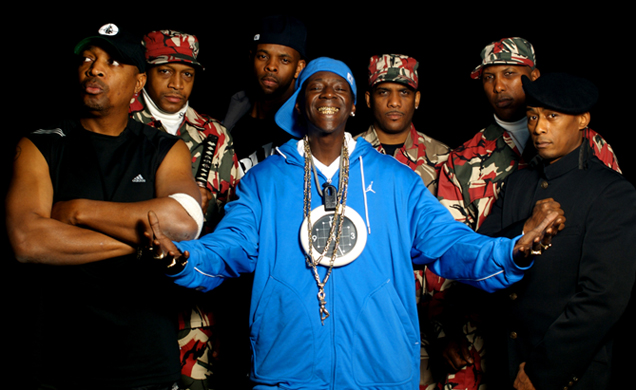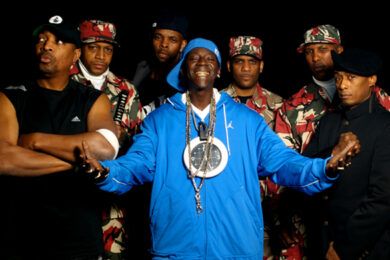Most the time music nostalgia makes me want to puke. And I’m not going to dignify that with some sort of bogus rationale, it’s just a gut reaction. I want to sniff the future. So I don’t go a bunch for the whole ’Don’t Look Back’ concept, and I haven’t been to one yet, despite loving a fair few of the records represented.
But today, for the first time, I’m tempted. And it’s not just that the promoters have finally got round to embracing hip-hop. This season also has Raekwon doing Only Built 4 Cuban Linx, but this week it is Public Enemy’s performance of their second album and first undisputed masterpiece It Takes A Nation Of Millions To Hold Us Back.which has got me conflicted.
To be fair. it could be nostalgia. I’m that age, old enough to remember the shit they stirred and love them for it. Old enough to be shocked by the relentless sonics of The Bomb Squad and intimidated by Chuck D’s commanding bass tones, towering over the whole beautiful mess like a bastard test-tube child of Isaac Hayes and MLK. Aggressively intellectual, his every word poised somewhere between invitation and command to mental riot. Fun, in a very intense way,
Old enough now to be young enough then, spinning ’Cold Lampin’ With Flavor’ on repeat trying to divine meaning from the great Flav’s ’shinavative ill factors’. To appreciate what sounded like a spontaneous series of shaky improvised jump cuts from quick-fired micro beats to any one of dozens of molten phrases, from ’Armageddon! Been in effect! Go get a late pass!’ forward’.
And I appreciate its peculiar cultural influence on our little island. Its position as the album a generation of dysfunctional English teenagers lost their hip-hop cherry to. An album which defined hip-hop so definitively for thousands here and millions worldwide that to this day they remain broken hearted, unable to accept what the genre’s turned to since. But that’s not why I’m tempted.
I’m tempted because right now it seems like time for a revolution. It seems appropriate. I’m tempted because, speaking to Chuck, he doesn’t seem in the mood for looking back, either.

“Throughout our whole career we’ve never repeated ourselves, never made the same album. That’s especially true for the first four. When we made Yo, Bum Rush The Show we made it from a New York standpoint, because that’s where we were at. I think the thing about It Takes A Nation Of Millions is it’s a global experience”
Down to opening with a recording of an Englishman.
“Right. That was big. That was very important. We wanted to also put together a concept album in the same realm as the classic albums. The Beatles, Earth Wind & Fire’s ’Gratitude’. We wanted to put together something that signified a live album, but also some great studio work. We had knowledge of ’James Brown Live At The Apollo’, we had knowledge of ’Seargent Pepper’ and ’Revolver’ by The Beatles, we were record collectors. So we wanted to make a ’What’s Going On’ of rap.”
Did a lot of the ideas come from necessity, from the limitations of the technology?
“It wasn’t that we took records and rapped over them, we actually had an intricate way of developing sound, arranging the sound. We had musicians like Eric Saddler, we had unbelievable records, the sonic tools, Hank Shocklee, the Phil Spector of hip-hop. You’ve got to give the credit as it’s due, if Phil Spector has the wall of sound Hank Shocklee has the Wall Of Noise. It was truly a group effort.”
Do you see these concerts as purely a nostalgic thing?
“No, I haven’t thought about it much. We’ll see how the practices go. Right now it’s more like a promoter selling something to the fans. But that’s our challenge. I can’t tell you that I’m thrilled about it, but we’ll pull it off.”
So the whole format of the show has been dictated to you?
“And we’re not wholly comfortable with it. But you’re either gonna do it or you don’t. And I think it’s a worthwhile challenge, but I’m not saying that I’ll take it with a smile. It’s yet to be determined how I feel about it.”
Generally are you a nostalgic person?
“Yeah, I think so. It’s connecting with history.”
A song like ’Bring The Noise’ you must have performed hundreds of times, if not thousands…
“Yeah, but you know what? I just got off the plane at Charlotteville. And I was sitting next to a man leaning against the window. At first I thought he was Fats Domino, I couldn’t tell from the side, but then he turned around and I realised it was Percy Sledge. He wakes up and we talk. And I asked him how many times he’d sung ’When A Man Loves A Woman’ and he said it must be six million times. Which kind of puts ’Bring The Noise’ into perspective. Right there I thought if Percy Sledge can sing ’When A Man Loves A Woman’ six million times then I can do ’Bring The Noise’ for twenty more years, I have no complaints.”
What’s the difference in performances in 1987 and 2008
“You have the same elements that you always had, but back then we did 25 to 40 minute sets, non stop. Now it’s more of a two hour set.”
How does it feel feel putting yourself into the shoes of your twenty year old self?
“I look at them the songs the same way I always did. After a while you’re going to get to the point where you’re going to do the song or the song’s going to do you. Especially with high-energy, intense music. People don’t rap that fast no more.”
Do you think there’s any danger the messages in the album are trivialised by the nostalgia?
“No because in real time the length of time is not that long. In record time they are, but in real time they’re not. Twenty years is not that long in a hundred years’ time.”
How do you feel about Public Enemy’s influence on mainstream hip-hop? Have you been disappointed by the way hip-hop culture has developed?
“I would put our influence in the same way as Bob Dylan’s influence on rock. But I don’t have enough power to talk about whether I’m disappointed at the way it’s developed. I think you have to take everything into consideration all around the world. You guys are writing the stories. The impact comes from when we do interviews. Our impact in terms of hip-hop, you’ve got to take a poll count. Rap music is still highly undeveloped. We could stand to control our output a little bit better than what we’ve done.”
In what way?
“By making sure we take control of our reputations away from somebody else who has nothing to do with it.”
You mean record companies?
“Uh-huh.”
And magazines?
“Well, we have a bunch of journalists out there that actually understand. Whether or not they’re doing a good job is another question. And I think there’s a lot of young record companies who are doing their thing on the internet, using MySpace and YouTube, and I think that’s going to help. But the rest remains on the major record labels.”
Do you think It Takes A Nation OF Millions… would still sound radical now, to a teenager listening to it for the first time?
“I guess before you even get down to what’s being said it’s radical simply because it’s faster than anything on the radio right now. And yeah, it’s radical politically. The message is radical today because it’s not really being said a lot. You want it to not be radical, but it is because it’s totally different from Soulja Boy.”



